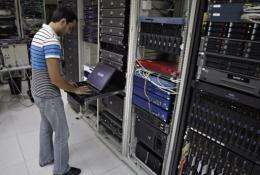Lebanon tries to catch up on Internet

Boudy Nasrala runs a successful brand design company in Lebanon, but when it comes to communicating with clients around the globe using the Internet, he knows to arm himself with patience -- lots of it.
"I recently finished a branding campaign for a new restaurant in Qatar but it would have been easier to put my work on CD and send it by express mail," sighed Nasrala, 34, who counts among his clients Pepsi and Microsoft.
"What takes three days by mail takes one week via Internet."
According to data recently published by speedtest.net, Lebanon ranks next to last -- behind Afghanistan and Sudan -- among 172 countries tested for their Internet speed.
Such findings fan the anger of Lebanese who snap up new technological products as soon as they go on the market but whose enthusiasm is tempered by the country's snail's pace Internet connections.
"In Lebanon, you click on the send button and then you go about your other business," lamented Nasrala. "Something that takes 10 minutes to download in another country takes one day here."
Reacting to mounting anger among consumers and tech-based companies, the telecommunications ministry, which controls 80% of the lucrative market, at the start of October launched a project aimed at increasing Internet speed by up to eight times and reducing cost.
This is being achieved by increasing Lebanon's capacity on the fibre optic India Middle East Western Europe (IMEWE) submarine cable.
Political bickering between the ministry and Ogero, the government-owned telecoms company, had prevented the project from being implemented sooner.
"The cheapest package we are offering customers is one megabyte per second (Mbps) for $16 dollars (11.6 euros) a month as opposed to $70 (51 euros) previously," said Firas Abi-Nassif, adviser to Telecommunications Minister Nicolas Sehnaoui.
The next step, he told AFP, would be the deployment within the next two years of a fibre optic network so as to boost Internet speed even further.
But more than two weeks after the project for faster Internet was launched, barely 25 percent of consumers have noticed a change, according to a survey conducted by the Facebook group "Lebanese want faster Internet", which counts nearly 50,000 fans.
"They told us that Internet would be faster as of October 1 but they didn't specify the year," quipped one disgruntled consumer on the Facebook page, while another said: "We are a third (world) country, keep dreaming."
But Abi-Nassif insisted that improvement in Internet speed would come gradually and that he expects web penetration throughout the country to eventually increase by 40 percent.
Meanwhile the private sector, which controls 20 percent of the sector, has expressed satisfaction with the new plan.
"The state used to sell international Internet connection for 2,700 dollars per two Mbps whereas in France it costs 50 euros ($69)," said Habib Torbey, chairman of IDM, the country's top Internet service provider.
"Today the price has gone down to 429 dollars and that's good for the market," he added.
But despite lower prices, service providers complain that the state basically has a monopoly on the sector while private suppliers must renew their licences annually and pay taxes.
They insist that the sector needs to be privatised in order to encourage more foreign companies to do business in Lebanon.
"Many firms are turned away by the outrageous cost," said Khaldoun Farhat, general manager of Terranet, a service provider.
He said faster Internet would also likely create jobs in a country that suffers heavily from a brain drain.
For Mark Daou, who runs the "Lebanese want faster Internet" Facebook page, the government plan is too little too late.
"You need an ambitious masterplan," said the 32-year-old. "The government needs to understand that for our generation, Internet is as vital as water or electricity."
(c) 2011 AFP



















